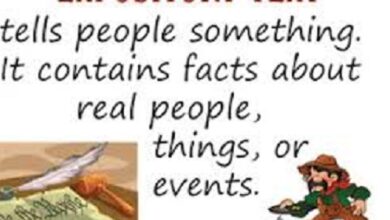Characteristics of speech with Types
The term discourse or speech refers to the various forms and trends of preparing a message through the expressive mechanisms and resources available to those who wish to communicate. In this article we will try to explain the concept of Characteristics of speech with Types
It should not be confused with the common use of speech as a synonym for speech, presentation or situation in which a person addresses an audience orally.
The study of discourse as such: its methods of realization, its variants of influence and its characteristics, are the task of discourse analysis, a common practice to various areas of study , such as psychology , sociology , linguistics, philosophy , the history and psychoanalysis, among others.
Speech/Discourse characteristics :
Concept
The concept of discourse can be defined, according to the French linguist Émile Benveniste , as “the concrete application of the linguistic system, when it is in charge or is assumed, even transformed, by the speaker in his speech act”.
This means that a speech is a specific and determined way of transmitting a message , contemplating the framework of rules, norms and agreements of a linguistic system, such as a specific language or a specific code, in which variants such as context influence , the purpose of the issuer, etc.
Types of speech/Discourse
According to its purpose and the elements of reality to which it pays attention, we can talk about the following types of discourse:
- Technological scientist. He who undertakes the knowledge of reality and its transformation for the benefit of human beings .
- Aesthetic. The one whose concern is the way the message is being presented: the arts and literature are a perfect example.
- Religious. He who, through stories, allegories and comparisons, proposes a model of cosmogony (origin of things) or a justified moral code in the divine commandments.
- Rhetorical. The one who intends to influence, convince, persuade the interlocutors, to mobilize them towards a certain attitude or thought .
- Educational. The one whose main concern is the transmission of information and knowledge in the best way.
- Historical. He who seeks to rescue the events that have occurred over time and establish between them some margin of understanding or conclusions .
- Political . The one who tries to build a model of a determined community and to influence the thinking of the masses.
Speech/Discourse forms
The forms of the speech are the specific strategies that allow the sender to transmit the message in a more effective or appropriate way for the situation.
- Narration . Count of events occurred either real or imaginary.
- Description . Presentation of the characteristic features of an object, person or situation in order to provide as much detail as possible.
- Dialogue. Reproduction of the thoughts or comments of two or more people, respecting the speech shifts in which the real or fictional conversation occurred.
- Exposure . It consists in referring in an objective, clear and direct way the message that you wish to convey.
- Argument . It consists in exposing in a subjective way, through opinions, reasoning and conclusions, the message that you want to convey to influence the receiver (s) of the moment.
Contexts
In the study of speeches, the series of meta and extra discursive factors that accompany it is taken into account , that is, the context in which communication occurs. The gestures, the previous information, the communicative situation itself, everything influences the elaboration of a speech, since all this provides the recipient with information.
Specialization
The speeches can be more or less specialized, which means that they can be decoded by more or less informed people , studied or prepared in some way to address the issue being communicated. For example, a conference on mathematics probably requires a moderately specialized audience, while reading a newsletter targets a massive and diversified audience.
Precision
The speeches can be more or less precise, that is, they can focus more or less on the theme or intention they pursue . A precise speech will be one that focuses more directly on its tasks, while an inaccurate one will be more errant, less accurate, will tend to wander and go astray.
Verifiability
Not all speeches are verifiable, nor should they be. Religious and aesthetic discourses do not aspire to be verified , that is, to prove the truth of what they expose. Other types of speeches, such as scientific, historical or educational, on the other hand, support their ability to convince and inform the total verifiability of their contents.
Continuity
The speeches are continuous, that is, they are sustained over time and do not occur at once , as could happen with actions. Speeches usually happen over time, given their linguistic nature: you need to reach the end of the said phrase to understand its full meaning, as well as read the last word of a writing to know what it says.
The discourse analysis as a practice emerged during the 60s as a transdisciplinary way of approaching communication and its characteristics , which allowed both a true explosion of ways of understanding discourse or discourse, and a greater understanding of the transmission of messages from the human being.
